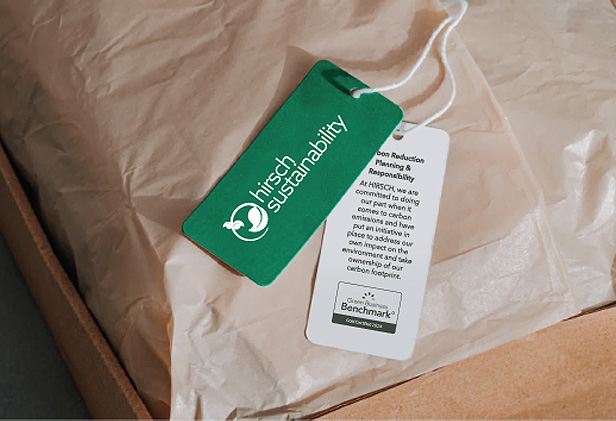Sustainability April 10, 2025
Hirsch Receives Platinum Certification From Green Business Benchmark
The Houston-based supplier also announced ESG initiatives, including long-term plans to reduce carbon emissions.
Key Takeaways
• Sustainability Commitment: Hirsch (asi/61005) has received a Platinum certification from Green Business Benchmark and announced a 10-year plan to reduce carbon emissions as part of its ESG strategy.
• Carbon-Neutral Goal: Hirsch aims to be carbon neutral by 2035, focusing on reducing Scope 1, 2 and 3 emissions, and said it has already purchased renewable energy certificates to account for 100% of its electricity use in 2023.
Hirsch (asi/61005) is getting serious about sustainability. The Houston-based supplier has received a Platinum certification from Green Business Benchmark (GBB) and announced a 10-year carbon emissions reduction plan, as part of its overall environmental, social and governance (ESG) strategy.

“We are thrilled to share our plans for conscious growth with our industry partners and clients,” said CEO Paul Hirsch. “Having sustainability initiatives are so important to us as an organization, as well as the rest of the industry, and we look forward to doing our part.”
GBB is a software-as-a-service sustainability management software meant to help organizations “achieve greater sustainability knowledge, impact and value,” according to its website. Per its public GBB profile, Hirsch achieved 903 points – which gives it a Platinum-level certification – thanks to a variety of initiatives it has taken to help reduce environmental impact, foster an equitable workplace and support community well-being.
Hirsch also detailed its quest to reduce its carbon footprint, noting that it has calculated its Scope 1 and Scope 2 emissions to create a baseline and has put a plan in place to reduce those emissions to be carbon neutral by 2035. The supplier also said it plans to reduce Scope 3 emissions by 50% in that same time frame.
Scope 1 emissions are direct greenhouse gas emissions that come from sources controlled or owned by an organization, like company vehicles and equipment. Scope 2 emissions are associated with the purchase of electricity, heating and cooling. For most companies, the vast majority of environmental impact comes from Scope 3 emissions – a sort of catchall category that includes indirect emissions that occur up and down a product’s value chain, including everything from business travel and employee commuting to the processing, use, distribution and disposal of goods.
Hirsch notes that it’s focusing on production policies and efforts to reduce emissions and overall carbon footprint. For its baseline emissions calculation year of 2023, the supplier said it purchased renewable energy certificates (RECs) to account for 100% of its electricity use. RECs are tradable, nontangible certificates that represent one megawatt-hour of electricity generated from renewable sources, like wind or solar.
“We understand that sustainability is not just a priority for our clients but a cornerstone of our shared future,” said Brittany Frase, vice president of sales at Hirsch. “By integrating eco-friendly practices and products into our company and offerings, we intend to meet the demands of conscientious consumers and drive meaningful growth.”

Promo for the Planet is your destination for the latest news, biggest trends and best ideas to help build a more sustainable and socially-responsible industry.
